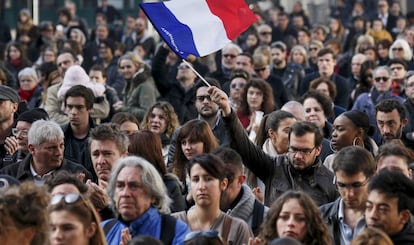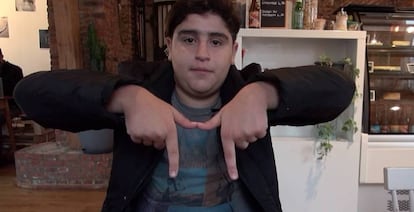Radically difficult: the problem of home-grown terrorism in Europe
The European Union is setting up new institutions to deal with the changing face of jihadism


The day after Salah Abdeslam was arrested during a police raid on his apartment in the Brussels suburb of Molenbeek, Aziz Benhamou, a 15-year-old schoolboy from the same neighborhood, was on the street below the jihadist’s home speaking about soccer player Lionel Messi.
While he argued over the Argentinian star’s abilities with three friends, Aziz moved the palm of his hands up and down. The animated gesture captured the attention of nearby journalists intent on extracting as much drama as they could from the arrest of Abdeslam, the world’s most wanted criminal for 126 days in the wake of the November 2015 Paris attacks.
Molenbeek has become synonymous of the failure of both Brussels and Europe to prevent the radicalization of Islamic youth
Home to perpetrators of some of the worst atrocities in recent years, Molenbeek has become synonymous in the media with jihadism and the failure of both Brussels and Europe to prevent the radicalization of Islamic youth. However, as far as the teenage children and grandchildren of second- and third-generation immigrants are concerned, police and media focus generated more of a circus atmosphere than one of terror.
Radicalization is, of course, not a problem confined to Belgium. It’s a European issue. “There is a lack of coordination,” says Elena Valenciano, vice-chair of the European Parliament’s Special Committee on Terrorism. “The member states are relatively new to the fight against jihadism. There are a lot of holes in terms of information policy, intelligence services and the coordination of police and border control.”
The need for cross-border cooperation became glaringly obvious when jihadists working out of Belgium participated in the Bataclan theatre massacre in the French capital. “Terrorism knows no borders,” says Olivier Roy, professor and expert in jihadism at the European University Institute in Florence. “Molenbeek also affects the French.”

For the most part, the fight against terrorism continues to fall to individual countries, but as the problem evolves, so does the role of the EU. According to Europol, 135 people died in 2016 in 13 jihadist attacks across the continent and 718 suspects were arrested, almost five times as many as four years ago.
Growing concern over the phenomenon has prompted the EU to set up new committees to deal with it. Little more than a year ago, the European Commission put British diplomat Julian King in charge of the Security Union while the Special Committee on Terrorism, set up in September, will publish an annual report on the possible errors and problems leading to terrorist activity.
The threat is no longer one nurtured behind closed doors in a seedy safe house. Instead, it flourishes like a virus on social media. “I can spend a year getting across a message in the mosque while extremists can attract hundreds of young people in two or three minutes with one Facebook video,” says Jama Habbachich, imam and president of Molenbeek’s Council of Mosques, who feels impotent in the face of online propaganda.
Radicalization is, of course, not a problem confined to Belgium, it’s a European issue
This is one area the EU is able to tackle. “We are working together with the big internet companies to make sure terrorist content either doesn’t appear on their platforms, or is eliminated immediately,” says Julian King.
The underground men
Who are the European extremists? Olivier Roy, one of Europe’s most distinguished experts on the matter, believes that jihadism is the result of the islamization of radical behavior that lies latent in any society. In his last book, Jihad and Death, he explains an extremist will typically be a second-generation youth, usually well integrated, who becomes radicalized in prison after committing a minor crime and goes on to reject his parents’ authority and their understanding of Islam, ultimately becoming involved in an attack and dying at the hands of the police. “These are underground men,” says Javier Lesaca, researcher at the George Washington University in the US capital. “They are the people who live on the margins of society. Their profile is one of frustration.”
Lesaca agrees with Roy that the religious factor is secondary. The 1,500 videos that ISIS has uploaded in the last three years have more to do with popular video games than a religious message from the mosque. “Daesh (ISIS) hardly knows how to use religion,” says Lesaca, author of Weapons of Mass Seduction, which examines the audiovisual propaganda tools used by the terrorist organization. “They put out Western cultural references. They know they are speaking to the millennial generation.”
I can spend a year getting across a message in the mosque while extremists can attract hundreds in two or three minutes with one Facebook video Jama Habbachich, president of Molenbeek’s Council of Mosques
They are Muslims, certainly, but above all, they are extremists. As Roy writes: “What seduces and fascinates is the idea of pure revolt rather than the construction of utopia. Violence is not a means, It’s an end in itself. It’s a violence that has no future. Daesh didn’t invent terrorism, it draws from a pool that already exists.”
The legacy of pain in Europe
Paris, London, Barcelona, Nice, Berlin, Stockholm… Europe has been hit again and again by ISIS devotees. The damage inflicted that terrible night in Paris is still raw two years on. From a dark room in the Bataclan theater, Benjamin Cazenoves, a 35-year-old graphic designer, posted this chilling message online: “There are survivors inside. They are killing everyone. One by one. On the first floor. Hurry!” The experience haunts Cazenoves daily. “Your vision of life completely changes,” he said in a tribute to the victims of terrorism in Brussels. “Logically, you tell yourself you should be dead. So you search to give meaning to life.”
Twenty kilometers north of Paris, in the town of Saint-Leu la Foret, home to 15,000 people, the baker has bought the florist shop from Gilles Leclerc, who died in the Bataclan attack. The florist had been closed for months. Gilles, 32, ran it with his mother until that night in November when he took his girlfriend to the Eagles of Death Metal concert in the capital. The family has not heard from his girlfriend, Marianne, for a year-and-a-half. Physically, she emerged in one piece, but emotionally she was shattered. A plaque hangs near Gilles’s favorite Japanese maple tree at the Victor Hugo school where he studied: “It could live for 80 years,” his sister says, referring to the tree.
After the death of 130 people and injuries to another 400 in Paris, Molenbeek is concerned for its future. “In primary schools, there are children who believe in conspiracy theories, who deny the murders,” says Maite Martínez-Argarate, a teacher who has worked for 30 years in the community. “We can’t let the children believe that.”
We are vulnerable because we are an objective. European civilization is about keeping security at a premium while still living the way we want Member of the European Parliament Elena Valenciano
Meanwhile, José-Luis Peñafuerte, director of the documentary Molenbeek, a radical generation? says: “The situation is the same or worse than before. There are scarcely any subsidies to help young people and the stigma is worse because of everything that has happened.”
So how can we stop producing more people like Abdeslam? “You can’t,” says Lesaca. “Quick fixes such as closing borders and stigmatizing groups are not a good idea. These are shortcuts that don’t work. We have to make an alternative narrative. And nothing can be done unless the technology companies fight the phenomenon online.”
“We are vulnerable because we are an objective,” says Member of the European Parliament Valenciano. “That’s European civilization as a whole. It’s about keeping security at a premium while still living the way we like to.”
Twenty months after Abdeslam’s arrest, Aziz appears in a café. With parents from Morocco, he is one of the rootless second generation currently under the microscope. Close to the canal that acts as a border between Molenbeek and the rest of Brussels, the venue is a far cry from typical Moroccan cafés where men chat under the watchful eye of King Mohamed VI. There’s no hint of 1080 either, the Molenbeek postcode used to refer to the neighborhood Aziz has grown up in. Aziz’s conversation is liberally sprinkled with the expression, ‘Tu vois’ (You know?). He is almost 18 and is toying with the idea of dropping his studies. And although he was born in Brussels, when it comes to the Belgium-Morocco game, he doesn’t think twice. Morocco gets his support.
English version by Heather Galloway.